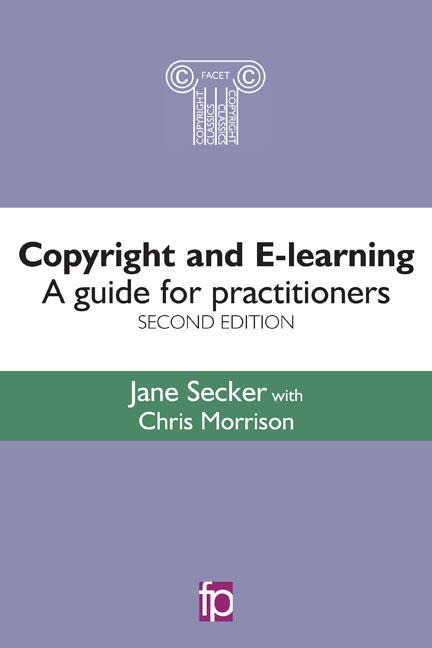Book contents
- Frontmatter
- Contents
- Figures, tables and case studies
- Preface to the second edition
- Introduction
- Abbreviations and acronyms
- Glossary
- 1 E-learning and copyright: background
- 2 Digitizing text-based content for delivery in a VLE
- 3 Using digital media: video, images, sound and software
- 4 Copyright issues and born digital resources
- 5 Copyright in the connected digital environment
- 6 Copyright education and training
- 7 Conclusion
- Further resources
- Index
6 - Copyright education and training
Published online by Cambridge University Press: 08 June 2018
- Frontmatter
- Contents
- Figures, tables and case studies
- Preface to the second edition
- Introduction
- Abbreviations and acronyms
- Glossary
- 1 E-learning and copyright: background
- 2 Digitizing text-based content for delivery in a VLE
- 3 Using digital media: video, images, sound and software
- 4 Copyright issues and born digital resources
- 5 Copyright in the connected digital environment
- 6 Copyright education and training
- 7 Conclusion
- Further resources
- Index
Summary
Introduction
As the digital learning environment develops it is becoming increasingly important to offer copyright education and training for teachers, lecturers, librarians, learning technologists, administrative staff, students and researchers. Acquiring and demonstrating the appropriate knowledge, skills and behaviours to enable the ethical creation and use of copyright material has been referred to as ‘copyright literacy’ (Morrison and Secker, 2015). An IPO and NUS study (NUS, 2012) found that students in all disciplines, not just creative subjects, wanted to know more about copyright, and a discussion paper by the UK Government's intellectual property adviser (Weatherley, 2014) recommended that copyright education should be embedded in the school curriculum within a range of subject areas. In some universities an understanding of copyright is being taught to students as part of digital literacy or entrepreneurship programmes, so students understand how to respect others’ intellectual property and protect their own. It can be far easier to infringe copyright in the online environment than in the classroom because digital technology facilitates the copying and sharing of learning materials, and learning activities that previously took place face to face are far more visible and open to scrutiny in a digital space. For example, in the UK higher education sector, the CLA periodically audits institutions by checking their VLE. In Chapter 4 this book discussed the relative ease with which lecturers and students can distribute many born digital files without realizing the legal implications that follow. This chapter describes how copyright literacy can be embedded into existing teaching and training programmes and regarded as part of improving teaching quality and developing open practices for the sharing of teaching materials.
A range of external bodies provide copyright education services for staff in educational establishments. Professional bodies for librarians such as the Chartered Institute of Library and Information Professionals (CILIP) and Aslib offer copyright training courses and have done so for many years, and several independent consultants also work in this area. Other organizations offer copyright training that focuses on particular types of resources; for example, Jisc Digital Media, the BUFVC and the Open University offer copyright courses for those producing multimedia content. There are also a range of training opportunities available for those in the cultural heritage sector, for example from bodies such as the Archives and Records Association and the Collections Trust.
- Type
- Chapter
- Information
- Copyright and E-learninga guide for practitioners, pp. 211 - 238Publisher: FacetPrint publication year: 2016



